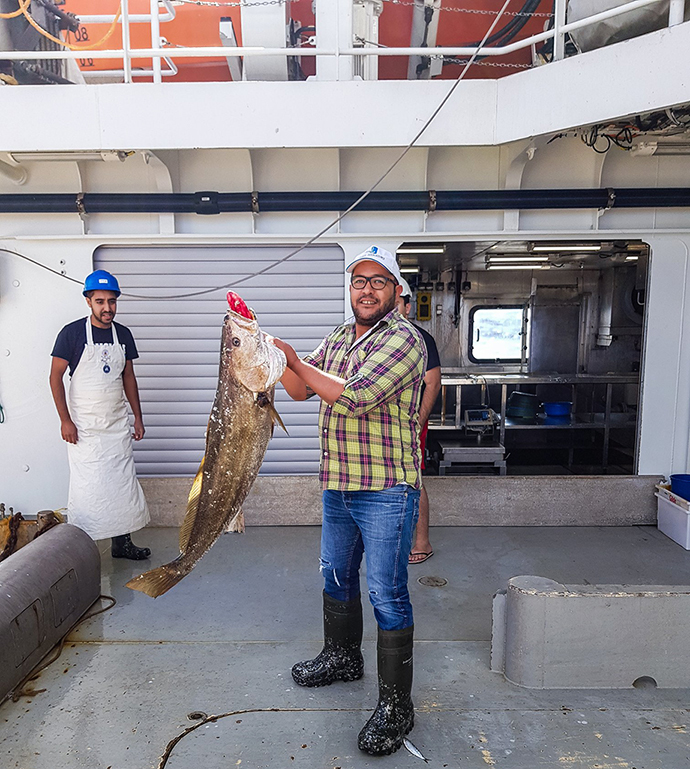Collaboration is key for the sustainability of small pelagics in the Eastern Central Atlantic Ocean
The role of small pelagics – including sardine, sardinella, mackerel, horse mackerel, bonga and anchovies – in sustaining food security and securing economic and social benefit for coastal countries in Northwest Africa, is significant. Yet, ensuring sustainable use and management of these resources is a challenging task. This is mainly because of the transboundary nature that drive these species to move across the exclusive economic zones of the countries in the sub-region, a behaviour which requires shared monitoring and management of fishing activities, and cooperation to avoid overfishing of these species.
 |
| Senegalese fishermen unloading fish from their boats to sell in local markets © FAO/Wessels |
Recognizing the need for a collaborative and holistic approach, FAO, with support from the EAF-Nansen Programme, other partners and concerned countries, initiated a Working Group to assess the state of stocks of small pelagic species off the coast of Northwest Africa, which was integrated into the advisory framework of the Fishery Committee for the Eastern Central Atlantic (CECAF).
The stock assessments are supported by the EAF-Nansen Programme that provides technical support and has contributed with survey data collected by the research vessel (R/V) Dr Fridtjof Nansen since the Working Group was established. “The EAF-Nansen Programme has regularly contributed to the study of small pelagics in the northwest Africa region since the mid-1990’s” said Merete Tandstad, coordinator of the EAF-Nansen Programme, and further explained that: “From 1995 to 2006, the Dr Fridtjof Nansen conducted surveys in the region regularly, and this series of surveys were the backbone for small pelagic assessments in the early days of the Working Group”. Survey data is also provided from other research vessels in the region, including those operated by member countries such as Mauritania, Morocco, and Senegal.
 |
| Women and men wait to sell their fish to local fish markets in Mbour, Senegal. © FAO/Wessels |
Appropriate arrangements for the fishing of shared stocks, for both management and scientific advice, have been discussed for years, highlighting the importance of regional collaboration for a better understanding of the state of transboundary stocks. This regional collaboration takes many forms, including the efforts of regional fisheries bodies such as CECAF, under which the working groups meet to conduct assessments, provide research recommendations and promote capacity development initiatives in cooperation with member countries and key partners. Another aspect is the collaboration through sub-regional organisations such as the Sub-regional Fisheries Commission (CSRP) and initiatives such as the Canary Current Large Marine Ecosystem Project (CCLME), to further strengthen fisheries management and the uptake of scientific advice.
Since 2001, the Working Group on the assessment of small pelagic fish for the northern sub-region of CECAF has met on an annual basis to assess the state of small pelagic resources and provide recommendations to fisheries managers and scientific communities in the region. However, due to complications of the COVID-19 pandemic, the meeting scheduled to take place in June 2020 was cancelled.
|
|
In February 2021, the Working Group met online for a preparatory meeting and to test the virtual meeting method. Based on the circumstances and the absence of a meeting in 2020, which caused disruptions in the exchange of data and the updating of the time series and other types of information by species subgroups for the year 2019, it was decided to hold two online sessions in 2021. The first (in February) to prepare the available data for 2019 and 2020, and the second (scheduled to take place in May) to perform the stock assessments and produce the Working Group report.
“Similar to many other initiatives, we had to make changes in the planned activities as a result of the COVID-19 pandemic” said Tarub Bahri, Fisheries Officer at FAO and member of the CECAF Secretariat. “During the meeting in February, regional scientists shared information about the effects of the pandemic, such as disrupting of fishing activities, shortage of fish and economic losses” she continued, and further highlighted that: “We still have an incomplete picture of how data collection was affected in the various countries, but we will know more in May when we are planning to assess the stocks and prepare the final Working Group Report”.
Another issue contributing to the lack of data and information from this period, is that many research activities had to be cancelled or put on hold. The R/V Dr Fridtjof Nansen conducted one pelagic survey for the entire region in late 2019 before all the research surveys of the EAF-Nansen Programme had to be suspended in March 2020, and these findings will feed into the stock assessments at the next meeting.
Pandemic or no pandemic, the FAO-CECAF Working Group on small pelagic species for the northern subregion will continue to boost collaboration between different scientific communities in the CECAF region as joint efforts and scientific advice is key for the future of small pelagic species in the Eastern Central Atlantic Ocean – as well as the marine ecosystem and people who depend on them.
Useful links
- Fishery Committee for the Eastern Central Atlantic (CECAF)
- More than fifteen years of collaboration on the assessment of small pelagic fish off Northwest Africa: Lessons learned and future perspectives
- Summary Report - FAO Working Group on the Assessment of Small Pelagic Fish off Northwest Africa 2019
- COVID-19 and its impact on the fisheries and aquaculture sector
For more information:
[email protected]

